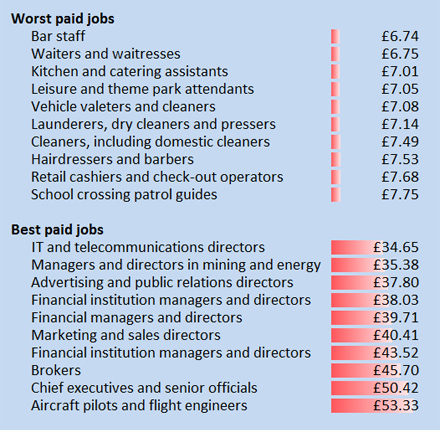The Effort Theory of Value
October 30, 2015 11 minutes • 2324 words
Table of contents
While building Adam Smith’s resource allocation system, I’ve often been asked:“What measure of value does it use?”
Unlike the current economic system which uses money (because it was directly descended from the Mercantile system and merchants only care about money), Smith’s system uses real value as a measure of value. He suggests grains as a long term measure of value (since everyone needs to eat), and precious metals as a measure of short term value (since metals are useful to all).
However, what does the wheat and precious metal actually represent?
Smith says that it represents ’labour’. But labour is ambiguous.
Marx uses the same measure in Das Kapital and ends up with the strange concepts like ’labour power’ and ’labour time’, which are measures of physical labour. These then lead to the oppressive rationing system in Communist countries.
You can exactly ration gasoline and electricity to your cars and iPhones, but it would be absurd to do that to humans. You could ration $1,000 to a software developer to build a wooden cabinet, and $1,000 to a carpenter to build an app. But their actual outputs would be inferior.
People confuse Smith’s labour theory with that of Marx simply because both use the word ’labour’. To separate those two ideas, we have to look into how differently Smith sees human labour.
A Deeper Look Into Smith’s Theory
Fortunately, Smith explains his theory in just one chapter – Chapter 5 of The Wealth of Nations . It is clear that ’labour’ to Smith is rooted in psychology instead of physics when he equates it to toil and trouble:
Toil and trouble are not objective.
Person A who has no interest learning how to play the guitar (who we shall call ‘Guitar Hater’) might ’toil’ a lot if forced to learn guitar, compared to Person B (‘Guitar Lover’) who naturally likes it. Therefore, the ‘high toil’ or suffering of Guitar Hater in learning guitar is consistently high always and everywhere he is. Likewise, the low toil or suffering of Guitar Lover in learning guitar is consistently low always and anywhere he is.
This is evident in Smith’s maxim:
Enter Relativity and the Constant of Personal Interest
Thus, the ‘cost’ or ‘price’ of guitar learning will be consistently ’expensive’ to Guitar Hater but consistently ‘cheap’ to Guitar Lover.
If their society naturally values guitar music, then Guitar Hater will be ‘poor’, while Guitar Lover will be ‘wealthy’ especially since he can ‘arbitrage’ his high quality but cheaply-earned guitar skill by selling it to society at a price that is high to them.

So the core idea in Smith’s theory is psychological toil and trouble instead of physical labour.
To establish this core idea, we replace ‘Labour theory of value’ with ‘Effort Theory of Value’ since the word ’effort’ best combines both psychological and emotional toil and trouble with physical work. ‘Work Theory of Value’ was also a good candidate. However, ‘work’ tends to mean more of the effect rather than the cause.
This way of thinking about another person’s love for guitar-playing (cause) instead of thinking about his actual guitar music (effect) is not common.
When you buy bread at the grocery, you often check the label and think about its price and nutrients. You never think about the baker who baked that bread and who was the cause of the existence of the bread. His name, skills, looks, personality, doesn’t enter your mind. Likewise, we see objects everday and never think about the persons or Creator that made their existence possible.
Eastern philosophy solves this by using a mantra constantly which forces the mind to always think of the causal principles behind every perception. Thanks to this technique, the mind is trained to look at the principles behind every perception, whether it be in economics, politics, healthcare, astrophysics, etc.
Shallow minds will think that money is the cause of economic activity because that is what their perceptions readily presents to them. From this, they will create utility theories, and then equilibrium and profit maximization theories, not knowing that such ideas naturally create crises after some time because they are based on effect instead of cause.

Personal Interest as the Invisible Hand
But effort alone will not lead to value-creation. No matter how hard a carpenter works to make an app, he will never make it better than the software developer can make it.
Thus to succeed, a person must be interested in what he is applying his effort to – he has to be deeply interested in whatever task he is doing.
This is where his ‘personal-interest’* comes in. Whatever one is interested in is a natural part of the invisible hand of his dharma or tao.
*The Invisible Hand of Dharma or the Tao separates self-interest from selfish-interest. In order to make the separation permanent, we shall call self-interest as “personal interest” in order to remove the vice of selfishness from it.
A person interested in guitars will naturally create higher quality* guitar music than someone who is not interested in guitars.
*We can call this a ‘superabundance’ in guitar music
Society would therefore have more value, quality, and abundance if its carpenters focused on making furniture, and its software developer focused on software instead of the other way around.
This value and abundance are then spread through exchange, such as through money, barter, credit, or donations, onto places where there is lack*:
*This balancing of abundance and lack manifests as entropy of thermodynamics in the physical dimension
How It Works
The Effort Theory of Value can be derived by asking: What is stressful to others that is not stressful to you?
By focusing on that task, then you are able to produce something that relieves the stress of others at less stress for yourself.
Those others might then want to give you something for it. They will give you something that is stressful to you to make, but not stressful for them.
For example, a farmer might find it difficult to make a website to advertise his potato harvest for sale. So he asks a web developer or programmer to make his website or social media page to let people know of his harvest.
The programmer finds it difficult to grow potatoes so he gets the potatoes of the farmer as part of the payment.
Matching Interest and Action
The matching of interest and action or occupation is the key to wealth. This is why Socrates put it as the core requirement of his ideal city-state and even for life itself:
This is the same reasoning behind the Hindu varna system wherein a family of farmers trains its some of its children as farmers, and a family of doctors trains some of its children as doctors. Unfortunately, this system degenerated into a rigid caste system that people got trapped into. Instead of the occupations being naturally dynamic, it became static.
To prevent this, one of the features of our proposed system is for the classification of careers to be done by artificial intellgence based on personality instead of heredity, so that society can have economic balance and higher quality of goods and services.

So how do we measure effort?
Since our valuation is based on effort which is subjective until it the buyers have decided on them with their objective purchase, then our initial measure for effort will be the thing that is needed by everyone to start the effort. With the human species, this thing is called food. Without food, no one can do any effort.
We find that this is exactly what Smith had in mind when he mentioned corn, which is shorthand for grains which represents food. You might not be able to print your own money or mine your own gold. But you can certainly grow your own food:
An Egyptian man in 3000 BC would need a similar amount of food that a modern man needs, even if the food yield of a hectare of wheat in both times might be very different.

From a Superphysics perspective (the paradigm that sees everything as waves instead of particles or objects), the effort theory of value bases value on natural waves of interests and desires . This is different from modern economic systems which base value on physical particles such as money.
With that, we can safely translate Smith’s 18th-century words into modern English without corrupting its deeper meaning and intention:
Original
a measure of quantity, such as the natural foot, continually varies. It can never be an accurate measure of other things; so a commodity which is itself continually varying in its own value, can never accurately measure the value of other commodities.
Equal quantities of labour, at all times and places, is be of equal value to the labourer.. The labor which he pays must always be the same, whatever the quantity of goods which he receives for it.
At all times and places, that is dear which it is difficult to come at and costs much labour.
Labour alone, therefore, never varying in its own value, is alone the ultimate and real standard or price. Money is the nominal price only.
Translated with ’toil and trouble’
A commodity that always varies in value can never be an accurate measure of the value of other commodities. Just as a natural foot can never be an accurate measure.. Always and everywhere, equal quantities of toil and trouble is of equal value to the worker.
In his ordinary state, he must always lay down the same portion of his ease, liberty, and happiness. The price which he pays must always be the same, though sometimes it buys varying amounts of commodity.
But it is the value of the commodities which varies, not his toil and trouble. Always and everywhere, a thing is expensive if it is difficult or costs much toil and trouble to acquire.
Toil and trouble never varies in its own value. Therefore, it alone is the ultimate and real price. Money is the nominal price only.

Smith’s Effort Theory of Value is seen in lowly-paid and highly-paid jobs. The former generally requires less effort than the latter, when taking into account the physical, mental, and emotional toil and trouble involved.
This post series will explain how the Effort Theory of Value can replace the Utility and Marginal Pricing paradigms of Economics to create a new economy called a “pantrynomy” that has zero inflation while having superabundance.






